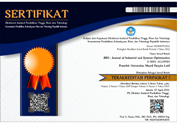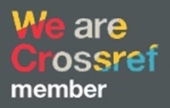PERANCANGAN MODEL BISNIS PRODUCT SERVICE SYSTEM (PSS) PADA BUS LISTRIK
DOI:
https://doi.org/10.51804/jiso.v6i2.95-101Keywords:
Product and Service System, Quality Function Deployment, Business Model Canvas (BMC), Strategic businessAbstract
Electric Bus is the EV (Electric Vehicle) product which supporting the green energy program. EV buses have short life cycle and suitable for city mass rapid transport. This research used Integrated Methodology into Business Model Canvas (BMC) to provide PSS on EV bus products. This business model has been translated to customer and company needs. This research was developed by modifying the input data information using Multi-layer Quality Function Deployment (QFD) and AHP method, which integrates customer and company needs. The result are 3 (three) business models of PSS, which represent business models M1- Product Oriented, M2-User Oriented, and M3-Result Oriented. There is business model M3-Result Oriented (Availability sarana/Buy the service) which recommended to be applied to the company. This model looks attractive for the customer because they don’t need to invest the product and it can optimize the operational cost. By this business model the company has more potential projects and repetitive revenue that the company can be achieved.
Bus Listrik merupakan salah satu segmen produk EV (Electric Vehicle) yang mendukung program green energy pemerintah. Bus Listrik memiliki usia peremajaan yang relative singkat, serta sangat cocok digunakan untuk tranportasi masal perkotaan. Pada penelitian ini menggunakan Integrated methodology dalam perancangan Bisnis Model Canvas (BMC) untuk mendapatkan model bisnis PSS untuk segmen produk bus listrik. Pada model bisnis ini telah diterjemahkan tidak hanya kebutuhan pelanggan tetapi juga mempertimbangkan kebutuhan perusahaan. Penelitian ini dibuat dengan melakukan modifikasi pada input informasi data awal dengan mengunakan Multi layer Quality Function Deployment (QFD) dan AHP yang diintegrasikan antara kebutuhan pelanggana dan perusahaan. Dari Hasil penelitian didipatkan 3 (tiga) model bisnis PSS yang mewakili bentuk bisnis model M1- Product Oriented, M2-User Oriented, dan M3-Result Oriented terdapat 1 (satu) model yang paling direkomendasikan untuk diaplikasikan oleh perusahaan yaitu model bisnis 3 (tiga) (Availibilty sarana/Buy the service). Model ini dipandang attractive bagi pelanggan karena pelanggan tidak perlu berinvestasi atas sarana serta dapat mengoptimalisasikan biaya operasi. Dengan model bisnis ini perusahaan memiliki potensi proyek dan pendapatan yang lebih banyak dan repetitif yang dapat diterima oleh perusahaan.
References
Adrodegari, F., Saccani, N., & Kowalkowski, C. (2016). A Framework for PSS Business Models: Formalization and Application. Procedia CIRP, 47, 519–524. https://doi.org/10.1016/j.procir.2016.03.073
BCG Consultant. (2021). First cut RJPP dan strategic objectives Klaster Logistik. In Resume Report RJPP Klaster logistic kepada Kementrian BUMN (Issue November).
Duru, O., Huang, S. T., Bulut, E., & Yoshida, S. (2013). Multi-layer quality function deployment (QFD) approach for improving the compromised quality satisfaction under the agency problem: A 3D QFD design for the asset selection problem in the shipping industry. Quality and Quantity, 47(4), 2259–2280. https://doi.org/10.1007/s11135-011-9653-4
Febriani, R. (2018). Perancangan Model Bisnis Product-Service System Pada Perusahaan Konsentrat Plastik. Tesis, 1–209.
Goedkoop, M. J. (2016). Product Service systems, Ecological and Economic Basics Product Service systems, Ecological and Economic Basics (Issue March 1999). https://www.researchgate.net/publication/293825785
Jakarta, T. (2020). Virtual Workshop TARIF LISTRIK ELECTRIC VEHICLE (E-BUS) (Issue September).
Karningsih, P., & Kusumawardani, C. (2022). Redesign of Railroad Stairs Using a Multi-Layer Quality Function Deployment Approach. PROZIMA (Productivity, Optimization and Manufacturing System Engineering), 6(1), 1–13. https://doi.org/10.21070/prozima.v6i1.1560
Kim, Y. S., & Lee, H. (2021). Process characteristics of Product-Service Systems development: Comparison of seven manufacturing company cases. Journal of Cleaner Production, 286, 124971. https://doi.org/10.1016/j.jclepro.2020.124971
Manajemen PT INKA. (2021). Business Transformation. In Bussiness Transformation, Getting ahead of the Pandemic Crisis: Vol. I. https://doi.org/10.1007/978-3-319-78524-0_2
Marilungo, E., Peruzzini, M., & Germani, M. (2015). An integrated method to support PSS design within the Virtual Enterprise. Procedia CIRP, 30, 54–59. https://doi.org/10.1016/j.procir.2015.02.021
McKinsey & Company. (2020). Manufacturing cluster roadmap Roadmap full document KBUMN (Issue April).
Sousa-Zomer, T. T., & Miguel, P. A. C. (2017). A QFD-based approach to support sustainable product-service systems conceptual design. International Journal of Advanced Manufacturing Technology, 88(1–4), 701–717. https://doi.org/10.1007/s00170-016-8809-8
Susur, E., & Engwall, M. (2023). A transitions framework for circular business models. Journal of Industrial Ecology, 27(1), 19–32. https://doi.org/10.1111/jiec.13363
Downloads
Published
Issue
Section
License
Copyright (c) 2023 JISO : Journal of Industrial and Systems Optimization

This work is licensed under a Creative Commons Attribution-ShareAlike 4.0 International License.
With the receipt of the article by JISO Editorial Board and the decision to be published, the copyright regarding the article will be transferred to JISO. The copyright transfer form can be downloaded here.
JISO has the right to multiply and distribute the article and every author is not allowed to publish the same article that was published in this journal.
JISO is licensed under a Creative Commons Attribution-ShareAlike 4.0 International License.
Under the following terms:
Attribution — You must give appropriate credit, provide a link to the license, and indicate if changes were made. You may do so in any reasonable manner, but not in any way that suggests the licensor endorses you or your use.
ShareAlike — If you remix, transform, or build upon the material, you must distribute your contributions under the same license as the original.














